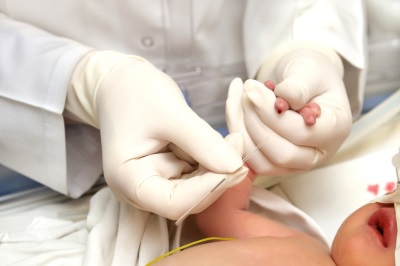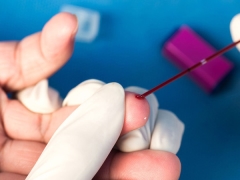General blood test of the child
Every person faces blood tests from birth, so mothers should know when blood tests are recommended for children and why they are being performed.
Planned baby
Blood tests are included in the planned clinical examination of babies up to a year in order to identify possible abnormalities and begin to treat them at an early stage.
For the first time a healthy infant is prescribed such a study at 3 months of age. It will help eliminate anemia and determine whether the baby is ready for routine vaccination.
Further, the blood test will need to pass in 12 months during a comprehensive comprehensive examination, including examination by specialists and other tests.

Unplanned
A blood test can be prescribed for various diseases and complaints from the child. It is worth exploring blood for a protracted course of diseases, which usually pass without complications and rather quickly. The survey also helps to assess the severity of the disease and the effectiveness of the prescribed treatment.
Training
Traditionally, a blood test is recommended to take in the morning and not have breakfast. But with young children to comply with this condition can be difficult. If the child is very hungry (especially if it is a baby), you should not leave it without breakfast. Passing an analysis on an empty stomach is a recommendation rather than a strict rule. In addition, hunger for an infant can be quite a lot of stress, which can change blood counts more than morning feeding. But still, if you fed the child, go with him to the clinic in 1-2 hours.
Pay attention to the psychological preparation of the crumbs for analysis, if the child is already more than a year old. Tell the baby what will happen in the office so that the injection will not be a surprise for him and will not undermine your confidence in you.
Where can I take the analysis?
Blood from babies taken in children's clinics in the treatment rooms, which work in the morning. At any time of the day, an analysis can be taken in the hospital if there are indications for this. Also, the state of the blood can be determined in medical centers and private laboratories.
Blood tests primarily distinguished by indications. The most common is a general (clinical) analysis. It is carried out even healthy kids. Deciphering the total blood test was reviewed by us in another article.
What results are considered bad?
Mom and the doctor with a general blood test should be alerted by changes in hemoglobin level and the number of red blood cells, since a decrease in these indicators is characteristic of anemia. By the number of leukocytes and their ratio, it is possible to diagnose an infection in a child, and also to determine whether it is viral or bacterial.
An increase in such an indicator as ESR suggests that there is an inflammatory process in the body of the baby.










